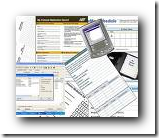One more good story about a hospital going electronic, but it does make one good point, the amount of information being transferred. We are all in the age of information overload and and importance of getting better credible records could not be more important, but think of the volume and how much time a health care individual has to adequately review all the information, thus the question, do we need better filters? Sure we do, especially in an emergency situation no doubt.
This is a hot topic everywhere and health records are no different. We not only have so many different systems in place today, and some offer volumes of data that could entail a physician reading almost what one could call a “novel” before diagnosis and treatment begins. So along with the good comes this possibility as well, thus filters as to what is critical and immediate need to be shown on the screen quickly and accurately.
When it comes right down to it, we are still just humans needing to cut to the chase to take care of our fellow humans in healthcare, thus systems that can adequately filter and present the most relative information on a screen are important. Electronic Medical records are joining the same arena that exists in other industries and the call for better and accurate filters with workflow information is also becoming a issue and topic of conversation that will need some work too, as we don’t really need more information in some areas, we just may need better algorithmic filters at times as the quantity of information available continues to grow. The insurance carriers of the industry know all about algorithms when it comes to claims and qualifications too, but I believe they might even be having issues with the same overloads at their end as well. BD
At Doylestown Hospital, medical imaging scans, lab tests, even patient progress notes are kept in cyberspace, not in filing cabinets. Most health information arrives electronically, rather than through snail mail or fax.
The hospital was the first in the area to implement a bar-coding system for medications, virtually eliminating the possibility of errors that could hurt patients.
Besides a fully functioning electronic medical record, the hospital also maintains a health information exchange, which allows its doctors to electronically share health information, even access it through an iPhone or personal computers.
If doctors only have to press a button to send 15 pages of patient notes, Schneider’s concern is they’ll be less likely to self-edit. So the person who gets the information might only glance through it and overlook the important parts.
“If I send a nursing home 30 pages of stuff, it may not be possible for that nursing home to read through 30 pages to get to the three or four pages of nuggets,” he said. “That is dangerous.”
http://www.phillyburbs.com/pb-dyn/news/111-12212008-1641675.html
Related Reading:



0 comments :
Post a Comment